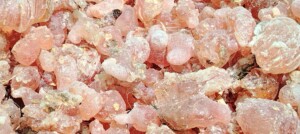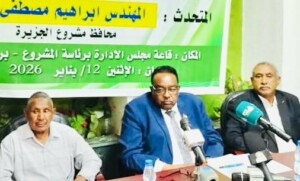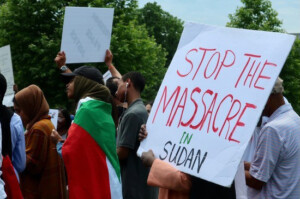Pests pose ‘dangerous’ threat to South Kordofan crops
Farmers are in distress due to a “huge” number of pests, including locusts, starlings, rats, and American worm damaging crops in South Kordofan, farmer Bakri Madi told Radio Dabanga on Saturday.
 Farmer harvests crops in the Nuba Mountains in South Kordofan (File photo)
Farmer harvests crops in the Nuba Mountains in South Kordofan (File photo)
Farmers are in distress due to a “huge” number of pests, including locusts, starlings, rats, and American worm damaging crops in South Kordofan, farmer Bakri Madi told Radio Dabanga on Saturday.
Swarms of large locusts are attacking Gum Arabic trees north of Dalami locality, and number of farmers in the Kartala area, affiliated with in Habila locality, are experiencing “a huge number of pests.”
According to Madi, the pests have become a major threat to the sorghum crops as they ripen on the plant, putting pressure on farmers to harvest the crops before they are eaten by pests.
Madi said that a team from the Plant Protection Department (PPD) at the South Kordofan Ministry of Agriculture conducted a field survey four days ago, which included the areas of Habila and Kartala, to determine how much of a threat the pests pose to sorghum crops. They said that the threat is “dangerous.” They also noted that “promises made by the PPD have not yet seen the light of day,” despite them being notified of the danger four days ago.
A Radio Dabanga correspondent tried to contact the governor of the state, Mursi Jabur, but was unable to reach him.
In September, the El Gezira and El Managil Farmers Alliance announced a categorical rejection of the increased taxes of SDG16,000 per feddan. Last week, a farmer in El Gezira told Radio Dabanga that the “current agricultural season is one of the most disappointing seasons that the area has experienced”, due to the high cost of upkeep and increase in taxes.
Last month, farmers in North Darfur appealed to the authorities and the Ministries of Agriculture in El Fasher and Khartoum to intervene and organise campaigns of spraying with pesticides to save the remaining millet and sesame crops.
According to a recent report published by the Famine Early Warning System Network (FEWS NET), Sudan’s growing acute food insecurity, recent flooding, and mass displacement as a result of intercommunal conflict, have led to Sudan being classified as a country in ‘crisis’.











 and then
and then